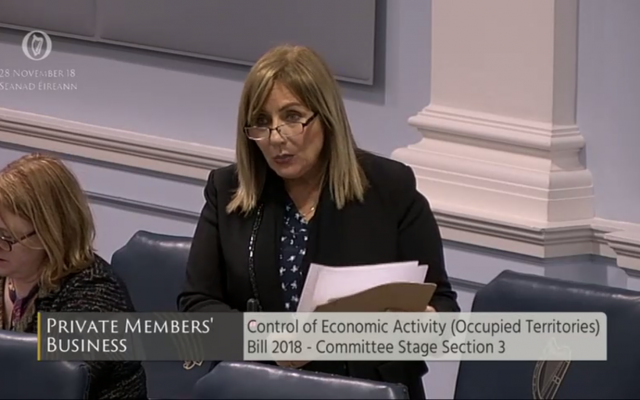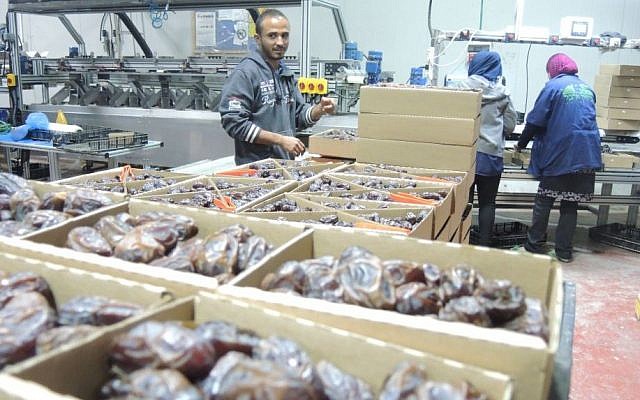Legislation still has numerous hurdles to overcome before it becomes law, and Israeli officials are confident the government will ultimately block it

The upper house of Ireland’s parliament on Wednesday advanced legislation that would criminalize importing or selling goods produced in West Bank settlements.
After a debate over some of its wording, the Control of Economic Activities (Occupied Territories) Bill 2018 moved from the third stage, known as the Committee Stage, to the fourth stage, the so-called report stage.
The bill, however, still faces several hurdles before it becomes law. After completing the fifth stage in the Irish Senate, it will then move to the lower house, known as the Dáil Éireann, where it will have to pass an additional five rounds of debates before the president would sign it into law.
The next debate on the bill was scheduled for Tuesday.
Israel’s Foreign Ministry on Wednesday evening declined to comment. But in private conversations, Israeli officials appeared unperturbed, estimating that the government in Dublin will ultimately prevent the legislation from coming into force, even, if need be, blocking it technically from advancing.
On Wednesday, the sponsor of the bill, Independent Senator Frances Black, defended her legislation against critics who argued that it was improper for a law to target only Israel.
“We are not singling out any state. No individual state is mentioned anywhere in this bill,” she said.

Black, a former singer from Dublin who entered parliament in 2016, acknowledged that she had long taken an interest in the Israeli-Palestinian conflict, but stressed that her bill may also apply to other occupations, mentioning Western Sahara.
An MP representing the government explained its opposition to the bill by arguing that it “requires the government to do something which is not in its power,” as banning certain products is the exclusive prerogative of the European Union.
“Goods from Israeli settlements can only excluded on the EU-level,” he said.
The proposed legislation — a private member bill — declares it an offense “for a person to import or attempt to import settlement goods.”
Likewise, those who “assist another person to import or attempt to import settlement goods” would be committing a crime punishable by up to five years in prison, if the bill were to become law.
“The bill seeks to prohibit the import and sale of goods, services and natural resources originating in illegal settlements in occupied territories,” Black said in a statement posted to her website on June 25.
“Such settlements are illegal under both international humanitarian law and domestic Irish law, and result in human rights violations on the ground. Despite this, Ireland provides continued economic support through trade in settlement goods.”
While the bill does not mention Israel and the Palestinian territories, critics have charged that it appears to have been written exclusively with the Israeli-Palestinian conflict in mind.
In July, after the bill passed the second stage in the Senate, Israel denounced the legislation.
“The Irish Senate has given its support to a populist, dangerous and extremist anti-Israel boycott initiative that hurts the chances of dialogue between Israel and the Palestinians; it will have a negative impact on the diplomatic process in the Middle East,” the Foreign Ministry said in a statement.
“The absurd in the Irish Senate’s initiative is that it will harm the livelihoods of many Palestinians who work in the Israeli industrial zones affected by the boycott,” read the statement, issued by the ministry’s spokesperson, Emmanuel Nahshon.
“Israel will consider its response in accordance with developments regarding this legislation.”

The Palestinians celebrated the vote.
“This courageous step builds on the historic ties between Ireland and Palestine, as well as it shows the way forward for the rest of the European Union,” top Palestine Liberation Organization official Saeb Erekat said in a statement issued before the vote was taken.
“Today the Irish Seanad has sent a clear message to the international community and particularly to the rest of the European Union: the mere talking about the two-state solution is not enough without taking concrete measures. Those trading with Israeli settlements are complicit in the systematic denial of the Palestinian right to self-determination.”
The Joint (Arab) List also welcomed the bill, saying it hoped it would “mark the beginning of a new stage in which Israel starts to pay an international political, economic and moral price for its actions.”
The bill’s passage would start “a new stage in treating the Zionist lobby as a danger to the values that Europe claims to represent,” the Arab Israeli party said.
As reported by The Times of Israel
